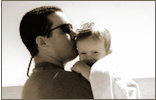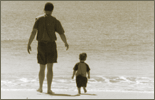The Unseen Things
In lieu of church this past Sunday I watched Bonhoeffer, a documentary about the German theologian and pastor executed for participating in plots to murder Hitler. It's worth your time and reflection. Watching it led me back to his book, The Cost of Discipleship, where I discovered this observation in G. Leibholz's memoir at the front:
"The majority of the people in all nations alike does not consist of heroes. What Dietrich Bonhoeffer and others did cannot be expected from the many. The future in modern society depends much more on the quiet heroism of the very few who are inspired by God. These few will greatly enjoy the divine inspiration and will be prepared to stand for the dignity of man and true freedom and to keep the law of God, even if it means martyrdom or death."
Leibholz then refers to Paul's second letter to the Corinthians: "...we look not at the things which are seen, but at the things which are not seen; for the things which are seen are temporal, but the things which are not seen are eternal."
We are accustomed to reading that passage as a description of the supernatural — invisible, ethereal, beyond our ken. Reading it in this context, however, clarifies that Paul was not simply describing the invisible quality of the supernatural, in fact, he says quite plainly that we look at it. Instead, he is describing that which man has turned his eyes from, the eternal true things, the lingering truths that we have eschewed in favor of temporal comforts and distractions. This is, it seems, why Leibholz's sad observation holds true. There are few heroes because we have no vision of the heroic, of truths greater than our immediate wants.
I am fascinated by the way most of us view the dark times of history, and inevitably place ourselves above the mass of people who furnished their energy and momentum. I wouldn't have joined the Hitler Youth. I could never buy and sell human beings. No cheering at the guillotines for me. And yet we recognize the truth in what Leibholz claimed, "The majority of people...does not consist of heroes."
It leads me to ponder how often I am not heroic in the everyday things. How often am I set on my own satisfaction, on the approval of others, on the avoidance of difficulty? How many lies and deceptions and cruelties do I abet, for lack of this vision of the eternal?
The encouraging — and frightening — element in Leibholz's observation, and in Paul's letter, is that any one of us can have this other-worldly vision, if we will have eyes to see. But we shrink from the vision and the call, Oswald Chambers writes, because "we know that if God does speak, either the thing must be done or we must tell God we will not obey Him." Better for our frail flesh if we are shortsighted, if we do not see the unseen things. Better to throw ourselves upon "cheap grace," as Bonhoeffer described it, a grace without obligation. But this lie, he explained, is one of the chief harms wrought by the modern church, because it teaches man that he might be saved without being changed.
Hence the cost of discipleship, wrote Bonhoeffer, because "what has cost God much cannot be cheap for us." I'm wrestling with this idea, and trying to peer into myself, where I have built faith on cheap grace, my house on sand, my hope on the world. I think costly grace, the only grace worth having, must begin with the vision of the unseen things, the true things. We neglect them for fear of how they might rebuke us, and what they will require. I suspect that when we look them full in the face, we cannot help but be changed. Recall Moses coming down from the mountain, his face shining from his time with God, and he not even knowing it until the people recoiled in fear. To look the neglected truths in the face is to be changed, and likely in ways that will cause the world to recoil.
So there are few heroes, and this will always be so. I learned in the documentary that at the start of Hitler's reign there were roughly 20,000 Protestant pastors in Germany, and of course a large number of Catholic churches. Within a handful of years, the Vatican had made peace with Hitler, while only a third of the Protestant pastors were willing to register opposition to what Bonhoeffer called the idolization of the state. Of these, only 100 were willing to persist, after Krystalnacht, and to form the Confessional Church, a body opposed to the prostitution of the church and the persecution of Jews. The shepherds became the goats. What would you have done, or I?
None of us knows, until that time. Survivors say that Bonhoeffer walked, naked, to the gallows, and told his executioners that his life was now beginning. He saw the unseen things. Who among us will dare to gaze at them as well, knowing what they might require?
People who know nothing of faith imagine that it is a chosen delusion, an easily purchased comfort. Bonhoeffer writes:
"We have a strange feeling that if Jesus himself — Jesus alone with his Word — could come into our midst at sermon time, we should find quite a different set of men hearing the Word, and quite a different set rejecting it."
Makes you wonder, doesn't it, what that sermon would be like, and how many of us could bear it?
Posted by Woodlief on February 13, 2007 at 11:26 AM






















